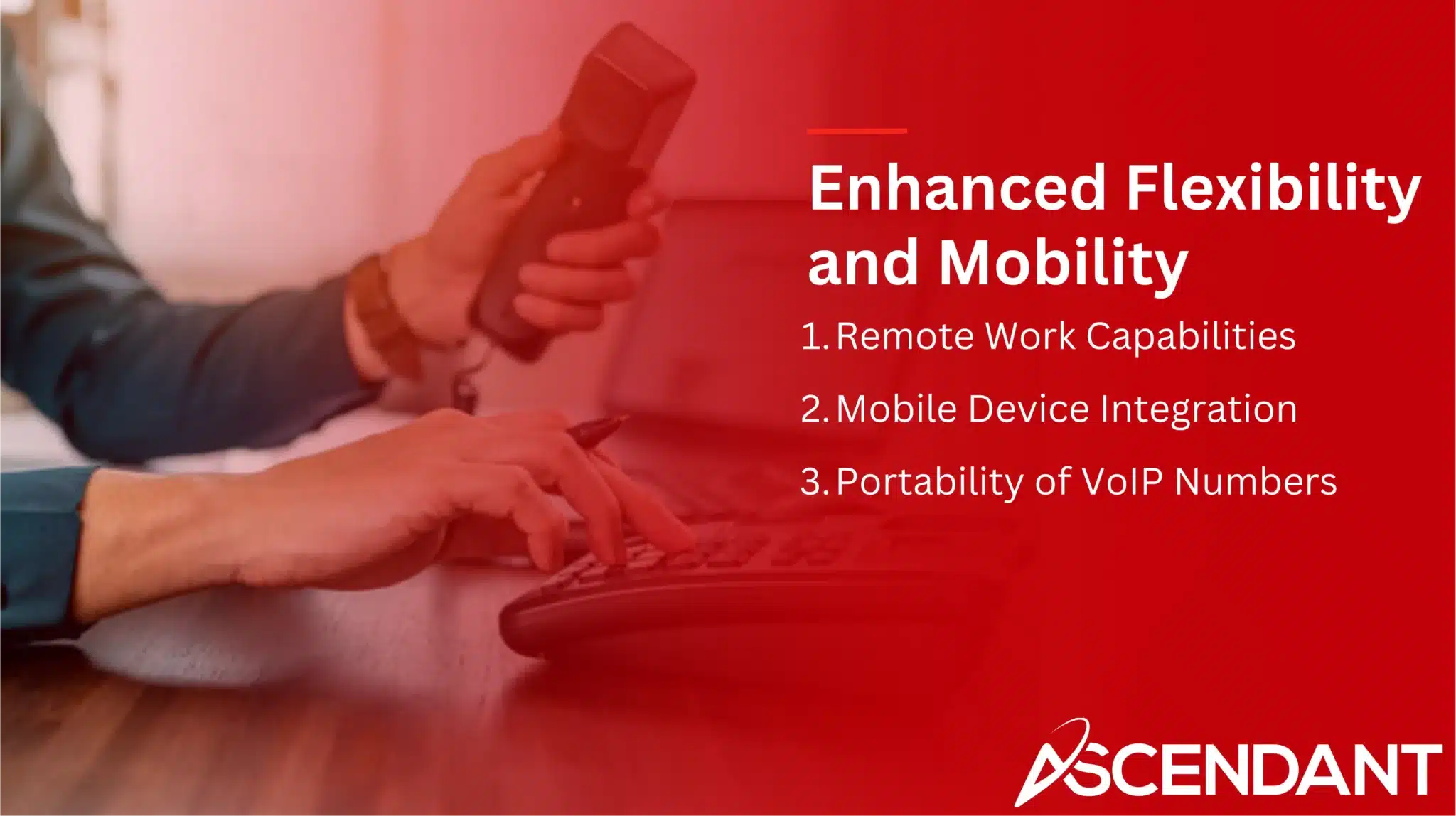VoIP, or Voice over Internet Protocol, is revolutionizing business communication. Why? Because it offers numerous benefits over traditional phone systems that can significantly improve efficiency and reduce costs. In this article, we will explore the top 10 benefits of VoIP that can drive your business success.
Key Takeaways
- VoIP significantly reduces costs for businesses, with potential savings of 50%-75% on telecom expenses compared to traditional systems.
- The flexibility and mobility of VoIP systems support remote work by allowing employees to use the service anywhere, ensuring constant connectivity and communication.
- VoIP offers advanced features such as video conferencing and integration with business tools that enhance communication efficiency and productivity.
Cost Efficiency
Businesses are increasingly adopting VoIP phone systems primarily due to the substantial cost savings they offer over traditional phone systems. By utilizing internet technology, VoIP presents a more economical option that can slash monthly telecommunications expenses by 50% to 75%. When weighing advantages and disadvantages, this is a persuasive factor for businesses considering the transition.
VoIP brings down operational costs through lower call rates, decreased expenditure on hardware, and the amalgamation of various communication services into one unified system. This integration simplifies business communication processes and eliminates the requirement for multiple distinct services. Enhancing cost-effectiveness.
Lower Call Rates
VoIP phone systems provide a substantial cost advantage by significantly reducing call rates. Companies using VoIP can slash their telephone expenses substantially when compared to conventional phone lines. A multitude of VoIP providers deliver complimentary local calls and offer packages that include unlimited minutes for long-distance calls within the country, aiding businesses in reducing expenditures. On average, the monthly expense for a VoIP line is under $20, whereas traditional landline services tend to cost about $50 per line.
When it comes to international calling, VoIP also presents impressive cost savings—up to 90% lower than what one would typically pay with standard phone service providers. For businesses engaging internationally or having overseas operations, opting for a VOiP system becomes an extremely economical choice due to these significant reductions in costs associated with international calls.
Reduced Hardware Costs
VoIP operates mainly using a broadband connection and does away with the necessity for extra hardware that traditional phone systems demand. As a result, businesses benefit from reduced startup expenses and a smaller initial investment. The integration of Power over Ethernet (PoE) technology also cuts down on needed wiring and equipment, solidifying VoIP as an economically advantageous option for business communications.
Consolidated Services
By merging voice, text, and video communications onto a unified platform, VoIP services simplify business communication by eliminating the necessity for disparate services. This streamlining fosters cost efficiencies. Through SIP Trunking, companies can repurpose current hardware to facilitate voice services, which leads to financial savings.
Enhanced Flexibility and Mobility
The modern business environment greatly benefits from the unmatched adaptability and mobility provided by VoIP systems. They permit seamless device transitions without requiring extra hardware, thus boosting operational versatility. Businesses that employ remote or on-the-move workers find this especially advantageous, as a VoIP phone system ensures they remain connected through VoIP phones no matter their location.
VoIP’s inherent flexibility is underscored by features such as mobile device compatibility, the portability of VoIP numbers, and support for remote work arrangements. For example, softphone applications allow users to handle business communications while traveling effortlessly, granting them full access to all the functionalities offered by their VOIP system.
 Remote Work Capabilities
Remote Work Capabilities
The advent of VoIP technology has revolutionized remote work by enabling workers to access their business phone lines from any location. The clarity of voice calls is significantly improved through the use of a stable internet connection with ample bandwidth and modern audio compression techniques, which facilitate uninterrupted communication. VoIP stands out as an economically favorable option for companies employing remote staff due to its abundance of features that are included without extra costs, in contrast to traditional PBX systems.
As employees operate from home, they remain linked to the corporate phone system, bolstering both their efficiency and collaborative efforts. In our current professional landscape where working remotely is becoming ever more frequent, having this ability is essential for successful business operations.
Mobile Device Integration
The integration of VoIP services with mobile devices allows employees to seamlessly receive business calls on the go, promoting constant connectivity. This bolsters communication tactics and boosts productivity by enabling effective communication without being constrained by location.
Portability of VoIP Numbers
VoIP phone systems offer a significant advantage in the form of number portability, allowing users to maintain their existing phone numbers even when relocating offices or during travel. This feature guarantees continuous business communication, which is vital for preserving client connections and ensuring operational effectiveness—something not typically possible with a traditional phone system.
Superior Call Quality
The call quality of VoIP systems frequently exceeds that of traditional landline phones thanks to developments like HD voice and collaborations with top-tier carriers. These improvements have markedly enhanced the clarity of VoIP calls. Nevertheless, variables such as jitter and latency may affect the call experience, although these can be mitigated through following recommended practices.
Key factors in sustaining excellent call quality include high definition voice along with a stable internet connection, coupled with minimizing latency and jitter levels. Typically, VoIP services provide at least a 99.9% uptime guarantee, which underpins their dependability for users requiring consistent communication capabilities.
High Definition Voice
Advanced audio compression techniques and codecs are essential for achieving clearer voice communication in VoIP systems. These advanced codecs enhance audio quality and ensure efficient bandwidth usage, leading to improved collaboration and productivity in business environments.
Reliable Internet Connection
To preserve superior VoIP call quality, a dependable internet connection is crucial. For peak functioning, it’s imperative that every device sustains at least 100 kbps of upload speed. This factor is vital for upholding high-quality communication. As the expense associated with internet service declines, high-speed connections become increasingly available for companies, thereby augmenting the quality of VoIP services even more.
Reduced Latency and Jitter
The quality of VoIP calls can be adversely affected by latency, which is the time lag in transmitting and receiving data packets, as well as jitter, which indicates fluctuations in the timing of these delays.
By securing a reliable internet connection and utilizing compatible hardware, one can markedly enhance the call quality within VoIP systems. This improvement is particularly notable when overcoming challenges associated with substandard internet connections.
Scalability and Growth Support
VoIP systems offer scalable solutions that evolve with business needs, negating the need for substantial hardware expenditures. In contrast to conventional PBX systems, VoIP can be scaled up effortlessly without intricate configurations or extensive wiring, thus facilitating businesses in adapting their communication infrastructure seamlessly during periods of growth.
Predictions indicate that by 2026, the VoIP market could attain a value of $102.5 billion, illustrating strong prospects for expansion and innovation within this technology sphere. As the quantity of IoT devices increases, VoIP systems’ inherent scalability ensures they can accommodate such burgeoning advancements easily.
Easy Line Addition
VoIP systems provide a straightforward solution for businesses to expand their phone lines or enhance existing ones with little difficulty, often without additional costs, thereby streamlining the process of business growth.
Flexible Service Plans
A reliable VoIP provider presents a range of service plans designed to cater to businesses of varying sizes. These business phone services are adaptable, ensuring that they can meet the specific needs of different enterprises while facilitating expansion and scalability through tailored VoIP offerings.
Advanced Features and Functionality
VoIP systems are outfitted with sophisticated capabilities that markedly boost the efficiency of business communication. Capabilities such as call forwarding and auto attendant, along with compatibility with various business instruments, refine the handling of calls and elevate operational proficiency.
VoIP facilitates unblemished connectivity across different channels including email, live chat, and social media platforms. These advanced features render VoIP an influential instrument for augmenting communication within a business setting.
Call Forwarding and Routing
VoIP systems are equipped with call forwarding and routing capabilities, enabling companies to reroute incoming calls to different devices, which guarantees that critical communications are always received. Businesses can customize how calls are directed by setting parameters such as caller identity or the time of day, thus improving their operational effectiveness.
Video Conferencing
VoIP services have incorporated video conferencing capabilities to facilitate effortless communication among team members, regardless of their location. This integration diminishes the necessity for in-person meetings, thereby substantially decreasing travel-related expenses for companies.
Integration with Other Business Tools
Integrating VoIP systems with CRM software facilitates automatic call logging, thereby bolstering customer service through instant retrieval of client details. The synchronization of VoIP and business applications promotes more efficient communication and optimizes workflow processes.
Increased Accessibility
By leveraging VoIP technology, businesses can significantly improve communication due to its high level of accessibility from different locations and through various devices. The ability to place calls from any area that has a stable internet connection underpins the flexibility it offers for remote work environments, underscoring the advantages of VoIP.
VoIP solutions enhance employee capabilities by enabling them to handle incoming and outgoing calls via their mobile devices. This feature promotes uninterrupted connectivity and grants employees greater freedom in communication methods, positioning VoIP as an indispensable asset for contemporary corporate operations.
Multiple Communication Channels
The integration of multiple channels such as text, voice, video, and instant messages in VoIP facilitates enhanced communication. It ensures that mobile employees maintain productivity by enabling them to communicate efficiently from any location.
Unified Communications
VoIP integrates a variety of communication methods, offering users a unified experience. It enables them to utilize voice, video, and messaging services via one consolidated platform, thereby improving the overall efficiency of communication.
Enhanced Security Measures
Ensuring the security of business communications is vital, and this holds true for VoIP systems. Compared to traditional phone systems, VoIP systems typically offer a higher level of difficulty for hackers attempting to gain access due to strategies like encryption, identity management, and continuous security patches that bolster communication safety.
VoIP systems can be more vulnerable to toll fraud incidents where unauthorized individuals initiate costly calls resulting in financial detriment. Despite this risk, hosted VoIP providers dedicate their efforts tirelessly towards safeguarding networks from potential vulnerabilities by implementing comprehensive security measures designed to provide businesses with secure frameworks.
Encryption and Data Protection
Encryption plays a crucial role in VoIP security by protecting against unauthorized listening and securing communication lines. Through the implementation of dedicated encryption protocols, both call information is shielded during its journey across networks, reducing vulnerabilities inherent to VoIP and internet protocol communications.
Implementing strong security practices, especially encryption, is vital for defending against various cyber threats such as interception of calls, theft of sensitive data, and interruptions caused by malicious entities.
Identity Management
Maintaining security and privacy in business communications is of paramount importance, and caller ID masking within VoIP systems plays a key role in protecting the identity of a business during calls. Features that control access are vital to thwart unauthorized usage and safeguard confidential business interactions.
Regular Security Updates
VoIP providers consistently update their software and applications to address vulnerabilities and improve security measures. By routinely rolling out these updates, they significantly mitigate the threat of security breaches by keeping pace with emerging security risks.
Simplified Maintenance and Management
VoIP systems streamline the maintenance and management process, making them perfect for businesses that want to minimize operational intricacies. Operating on cloud-based infrastructures, VoIP services help companies cut down on energy expenses related to running in-house hardware, while also simplifying upgrades and lessening the necessity for heavy investments in physical equipment.
Relocating business premises is greatly simplified with VoIP technology. It’s as straightforward as disconnecting and reconnecting phones. The complete portability of VoIP numbers means firms can keep their existing contacts throughout a move without affecting ongoing communications.
Cloud-Based Management
Businesses can notably cut down on capital expenses with cloud-based VoIP systems as they eliminate the necessity to invest in substantial hardware or employ dedicated IT personnel, thus offering an economical option for contemporary enterprises.
Minimal Technical Support Required
VoIP systems feature intuitive interfaces that make managing communications straightforward, negating the necessity for complex tech support and considerably decreasing the technical support needs associated with a VoIP system.
Environmental Benefits
VoIP technology provides a greener alternative for business communications, boasting considerable advantages for the environment. These systems are structured to utilize energy more sparingly than older phone systems, contributing to a decrease in greenhouse gas emissions. VoIP setups tend to require less electricity compared to operating several standard telephone lines, which curtails overall energy usage.
The transition toward VoIP technology aids in diminishing resource use and reinforces sustainable practices by cutting down on the necessary hardware infrastructure. As businesses adopt VoIP systems, there is also a marked reduction in tangible waste. This results from having fewer physical components such as circuit switches and individual traditional telephone lines required for operation.
Reduced Energy Consumption
Compared to conventional phone systems, VoIP systems utilize less power, which not only results in reduced operating expenses, but also fosters a more environmentally friendly approach to business. The enhanced energy efficiency of VoIP contributes markedly to substantial cost savings and bolsters efforts towards ecological preservation.
Less Physical Waste
VoIP systems reduce electronic waste and enhance sustainability by demanding fewer hardware components. Since they are predominantly software-based and utilize cloud technologies, there is less reliance on multiple physical devices that frequently require updating or replacement.
Future-Proof Technology
VoIP technology is crafted to align with forthcoming technological advancements, thereby assisting businesses in maintaining a competitive edge. By leveraging internet connectivity and minimizing reliance on conventional energy-intensive infrastructures, VoIP systems significantly reduce power consumption.
Providers of VoIP are consistently rolling out new features and functionalities to elevate the efficiency and user experience. This constant refinement guarantees that the evolution of VoIP technology persistently caters to the evolving demands of modern enterprises.
Ongoing Innovation
VoIP technology is constantly advancing, incorporating sophisticated features that boost both communication and operational effectiveness. VoIP providers regularly roll out new capabilities and enhanced functions to elevate the efficiency and user experience.
Compatibility with Emerging Technologies
Businesses must confirm that their VoIP service provider can accommodate all necessary devices and requirements, thus ensuring maximum compatibility with advancing communication standards. VoIP systems are inherently built to integrate smoothly with novel technologies, maintaining their applicability in the evolving landscape of communications.
Summary
VoIP delivers a wide array of advantages that considerably improve business communication and increase operational efficiency. It stands as an all-encompassing solution for current corporate demands, offering cost savings, enhanced call clarity, robust security protocols, and environmental benefits. Due to its scalable and adaptable nature, VoIP is perfectly suited for businesses aiming to expand and adjust within dynamic markets.
As technological advancements progress at a rapid pace, VoIP consistently remains at the cutting edge by incorporating new functionalities and maintaining compatibility with upcoming technologies. Embracing VoIP allows companies to future-proof their communication tactics while securing a competitive edge. Are you poised to explore the extensive capabilities of VoIP for your enterprise’s triumph?
 Frequently Asked Questions
Frequently Asked Questions
How does VoIP contribute to cost savings for businesses?
VoIP can really help businesses save money by providing lower call rates and needing less hardware.
Plus, it combines multiple services, leading to even greater cost efficiency.
Can VoIP support remote work?
Absolutely, VoIP supports remote work by allowing employees to seamlessly connect to the corporate phone system from virtually anywhere.
This flexibility makes it easier to stay in touch and collaborate effectively.
How does VoIP ensure superior call quality?
VoIP ensures superior call quality by using advanced audio compression, maintaining reliable internet connections, and reducing latency and jitter for clearer, more stable calls.
It really brings your conversations to life!
What advanced features does VoIP offer?
VoIP significantly improves communication by offering functionalities such as call forwarding and video conferencing, along with flawless compatibility with various business instruments.
Such innovations propel efficiency and productivity to new heights.
How is VoIP environmentally friendly?
VoIP is environmentally friendly because it requires less energy and hardware than traditional phone systems, which cuts down on electronic waste.
This makes it a great choice for those looking to be more sustainable.


